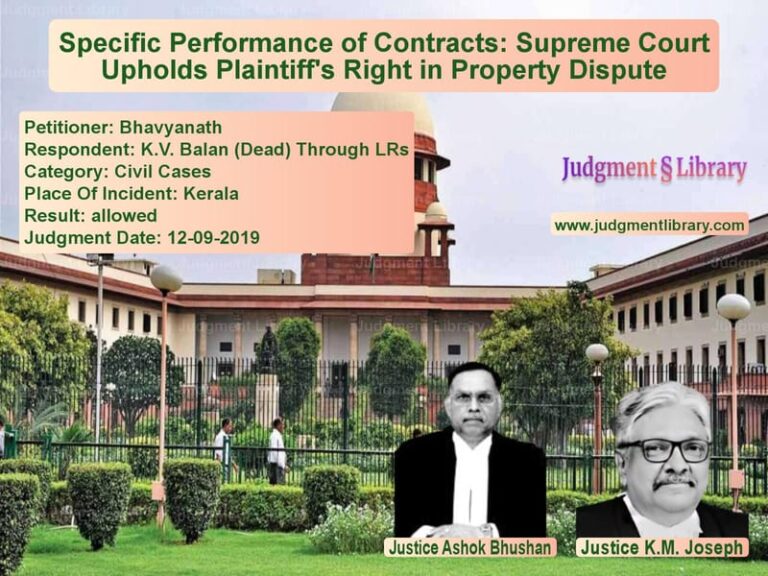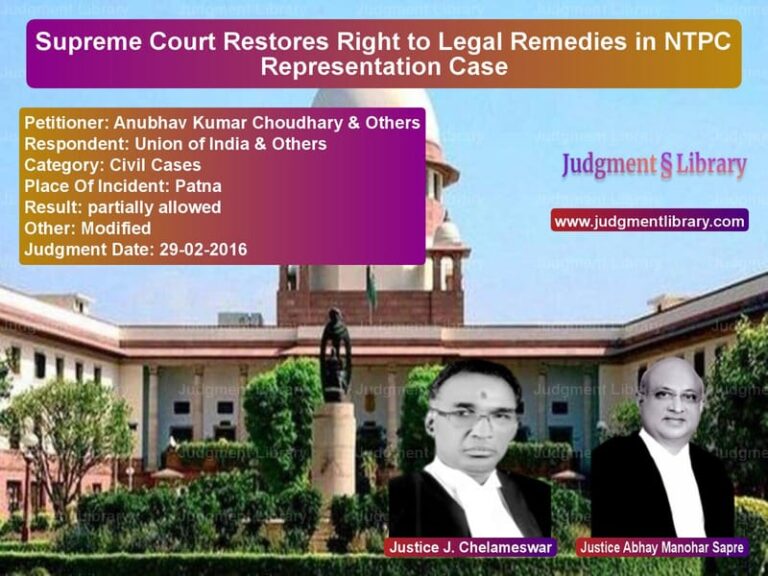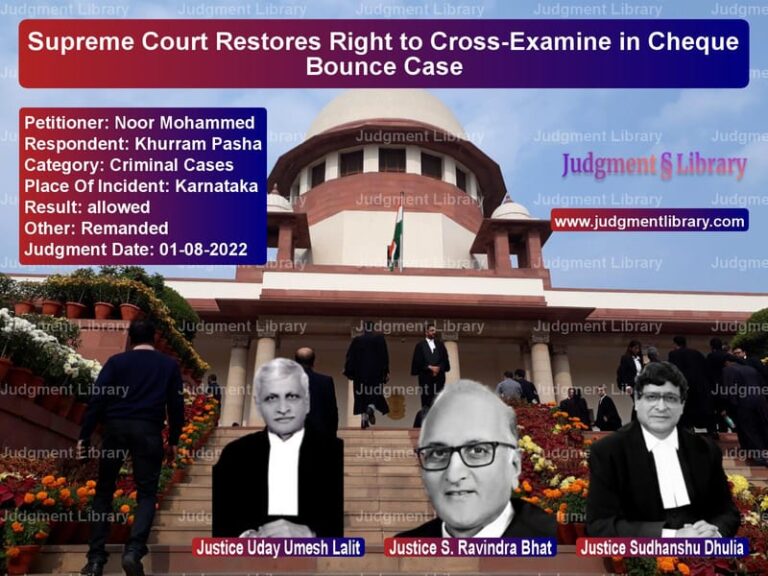Murder Conviction Overturned: Supreme Court Acquits Accused in Madhya Pradesh Shooting Case
The case of Virendra vs. State of Madhya Pradesh revolves around a long-standing property dispute that escalated into an alleged murder. The Supreme Court, in its judgment delivered by Sanjay Kishan Kaul and M.M. Sundresh, overturned the conviction of the appellant, ruling that the prosecution failed to prove its case beyond a reasonable doubt.
The appellant had been convicted under Section 302 read with Section 34 of the Indian Penal Code (IPC) for allegedly shooting the deceased, Main Babu, over a property dispute. The key issue before the Supreme Court was whether the evidence presented by the prosecution was sufficient to uphold the conviction.
Background of the Case
The case stemmed from a dispute between the deceased and the accused over land ownership. According to the prosecution, on 27 April 2001, at around 7:30 a.m., the deceased was shot dead by three individuals: Baijnath, Virendra (the appellant), and Suresh. The prosecution alleged that the attack was premeditated, given the long-standing land dispute.
Key events in the case:
- The First Information Report (FIR) was lodged by the deceased’s father (PW14) at 8:30 a.m. on the same day.
- The appellant and co-accused Suresh were arrested the next day.
- Firearms were allegedly recovered from the possession of the accused.
- The Trial Court convicted both the accused, sentencing them to life imprisonment.
- The appellant challenged the conviction before the High Court, which upheld the sentence.
- The appellant then approached the Supreme Court.
Prosecution’s Case
The prosecution relied on the following key pieces of evidence:
- Eyewitness Testimony: PW15, a key prosecution witness, claimed to have seen the appellant at the scene.
- Medical Evidence: The post-mortem report suggested that the deceased had been shot at close range.
- Forensic Evidence: Firearms allegedly recovered from the appellant and co-accused were tested.
- Recovery of Weapons: The police claimed to have recovered a pistol from the appellant.
Defence’s Arguments
The appellant argued that:
- The prosecution’s case relied heavily on the testimony of PW15, who was an unreliable witness.
- Other prosecution witnesses contradicted each other regarding the sequence of events.
- The recovery of the firearm was not conducted in accordance with legal procedures.
- The forensic evidence was inconclusive.
- There was no independent corroboration of the appellant’s presence at the crime scene.
Supreme Court’s Analysis
The Supreme Court examined the prosecution’s evidence and found multiple inconsistencies.
Unreliability of PW15’s Testimony
The Court observed that PW15 was the prosecution’s key witness but had several credibility issues:
“The evidence of PW15 cannot be relied upon as against the other prosecution witnesses themselves, which stood uncontroverted.”
PW15 claimed to have seen the incident but arrived at the scene much later, as per other witnesses. The Court noted that PW15 had a history of criminal cases and was facing charges under the NDPS Act.
Failure to Prove Recovery of Weapons
The prosecution claimed that firearms were recovered from the appellant. However, the Court noted:
“The recovery having not been proved in the manner known to law, coupled with inadequate evidence on record to implicate the appellant, we have no hesitation in overturning the conviction.”
The investigating officer (PW16) admitted in cross-examination that he had not prepared a proper recovery memo under Section 27 of the Indian Evidence Act.
Contradictions in Witness Testimony
Multiple prosecution witnesses gave conflicting statements:
- PW1 and PW3 were present at the scene but did not see the accused.
- PW14 (the deceased’s father) stated that he was informed of the incident by PW15, but PW3 said PW15 arrived much later.
- PW7 (the doctor) opined that the gunshot wounds could have been caused by a single weapon, contradicting the prosecution’s claim that multiple shots were fired.
Failure to Establish Motive
The Court found that while there was a property dispute, there was no strong evidence linking the appellant to the crime:
“A weak or unproven motive cannot substitute for concrete evidence.”
Legal Precedents Considered
The Court relied on several judgments:
- Javed Masood v. State of Rajasthan: “When prosecution witnesses support the defense, their testimony must be considered.”
- Raja Ram v. State of Rajasthan: “Prosecution witnesses who are not declared hostile cannot be ignored.”
- Dudh Nath Pandey v. State of U.P.: “Circumstantial evidence must form a complete chain before conviction.”
Supreme Court’s Ruling
The Court ruled:
- The conviction was based on insufficient evidence.
- The prosecution failed to prove the case beyond reasonable doubt.
- The appellant was acquitted.
Conclusion
The Supreme Court’s judgment reaffirms the principle that conviction must be based on solid evidence. In cases relying on circumstantial evidence, the chain must be complete and leave no room for doubt.
This ruling serves as a significant precedent for future cases, emphasizing that courts must critically examine evidence before upholding a conviction.
Petitioner Name: Virendra.Respondent Name: State of Madhya Pradesh.Judgment By: Justice Sanjay Kishan Kaul, Justice M.M. Sundresh.Place Of Incident: Chhattarpur, Madhya Pradesh.Judgment Date: 11-07-2022.
Don’t miss out on the full details! Download the complete judgment in PDF format below and gain valuable insights instantly!
Download Judgment: virendra-vs-state-of-madhya-prad-supreme-court-of-india-judgment-dated-11-07-2022.pdf
Directly Download Judgment: Directly download this Judgment
See all petitions in Murder Cases
See all petitions in Bail and Anticipatory Bail
See all petitions in Fraud and Forgery
See all petitions in Judgment by Sanjay Kishan Kaul
See all petitions in Judgment by M.M. Sundresh
See all petitions in allowed
See all petitions in supreme court of India judgments July 2022
See all petitions in 2022 judgments
See all posts in Criminal Cases Category
See all allowed petitions in Criminal Cases Category
See all Dismissed petitions in Criminal Cases Category
See all partially allowed petitions in Criminal Cases Category







